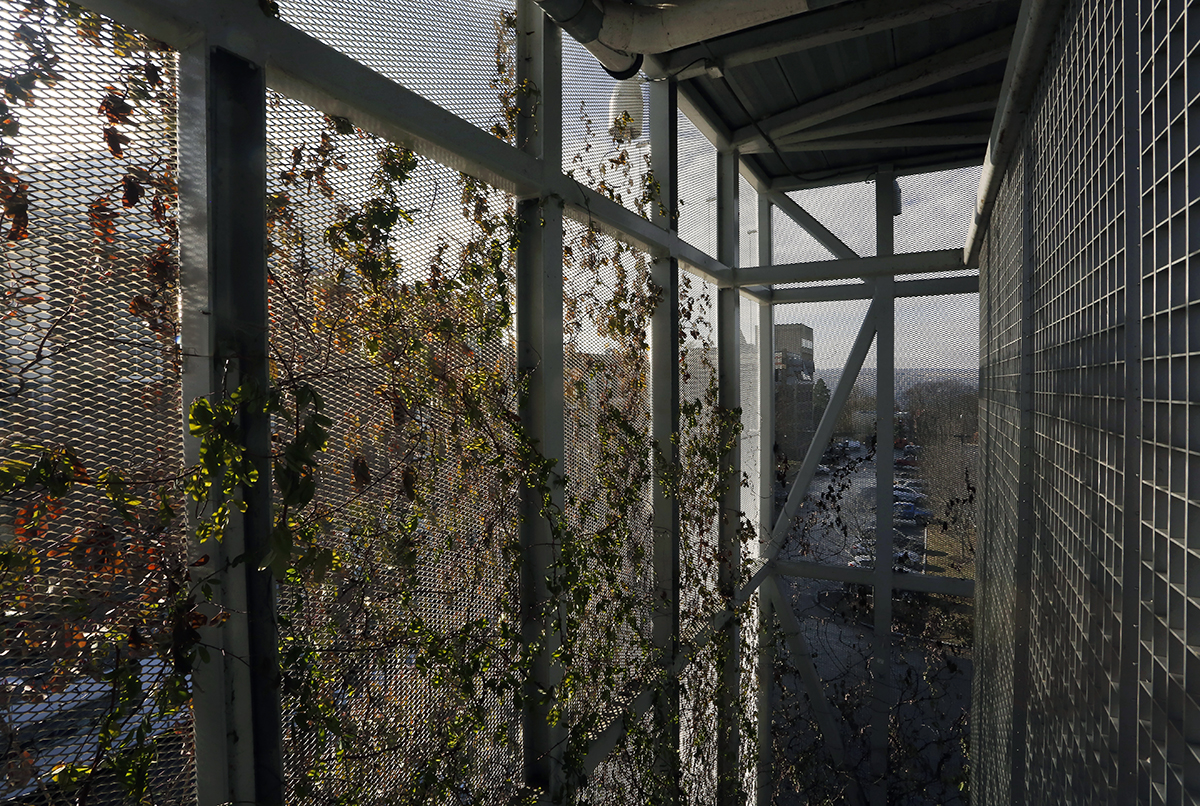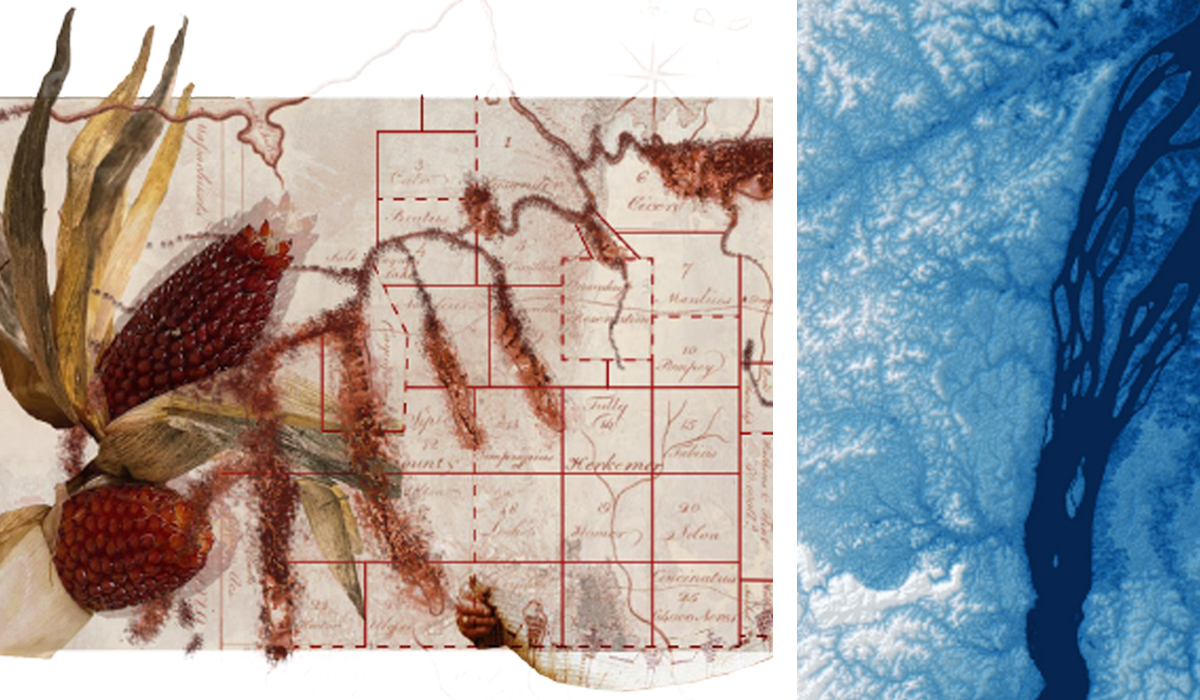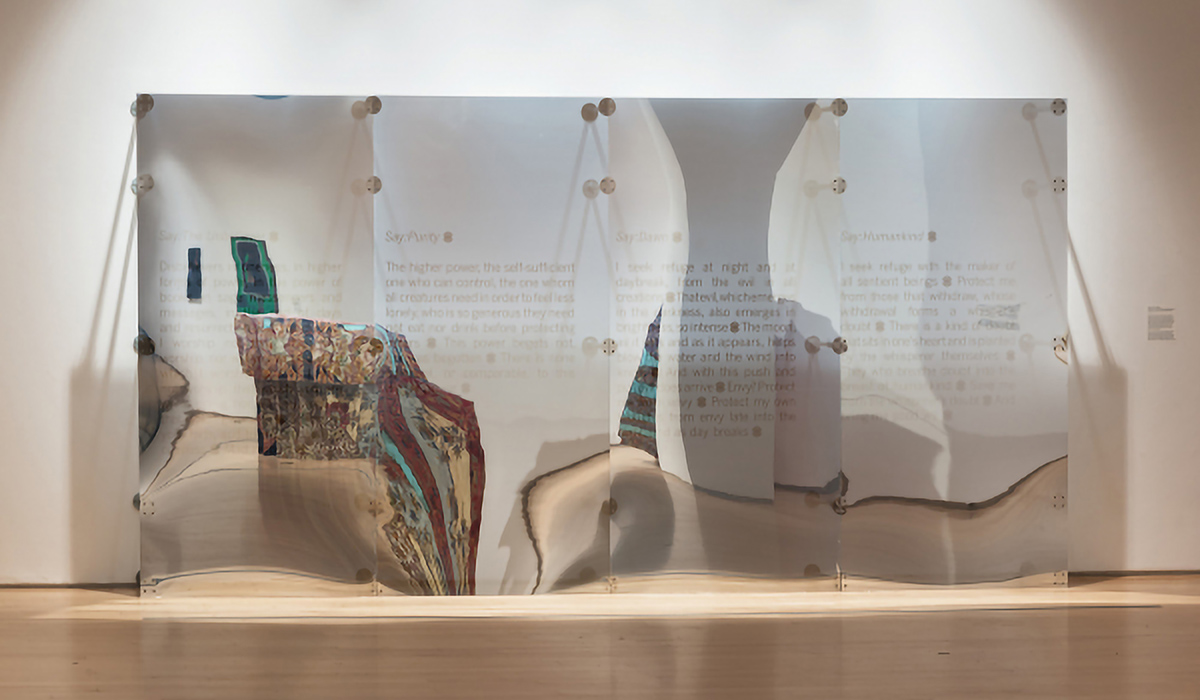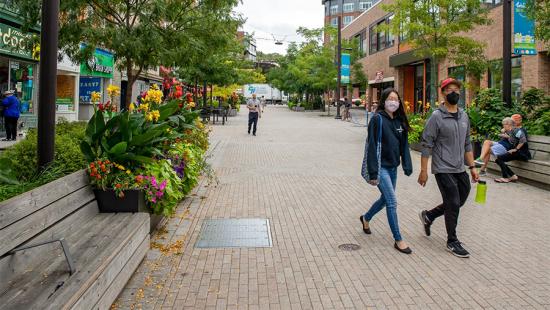Spring 2022: A Look Ahead
Following two years of extraordinary effort and resolve, flexibility, imagination, and creativity fuel the new semester.

In Dean Meejin Yoon's recent message to the community, she thanked faculty, students, and staff for their continued patience and partnership despite a constantly evolving landscape of modalities, protocols, and public health guidelines. "Your efforts and resolve, both last term and over the past two years, have been nothing short of extraordinary," Yoon said. "To date, our community has met each challenge with grace and imagination. And so, as we look toward a new year and semester ahead, I have no doubt we will do the same."
Her words set the tone for the spring semester as faculty, staff, and students continue to be flexible in the current phase of the pandemic. In Ithaca, the first two weeks of instruction will be virtual, with in-person instruction starting February 7. In New York City, instruction at the Gensler Family AAP NYC Center begins in-person on January 24, and the Cornell in Rome program starts off the semester virtually, with in-person instruction starting January 31.
Looking across the semester, the departments of art and architecture mark their 100th and 150th anniversaries this academic year, and both departments are planning events. Architecture's Preston Thomas Memorial Lectures, titled Breaking Ground(s), coordinated by architecture chair Caroline O'Donnell is scheduled for March. In art, guest speakers Baseera Khan (M.F.A. '13) and former art chair Buzz Specter will return to the department for talks and art chair Paul Ramírez Jonas and Assistant Professor Leeza Meksin will host a panel and public discussion of the synergistic relationship between art practice, critical thought, and public life in art education. Next month, in acknowledgment of a tradition of academic and professional excellence across the college, the new AAP Alumni Archive supported by alumna Mui Ho will launch with the first 15 of 40 total select profiles featuring the life's work of AAP graduates from the 1940s through the 1980s. More information about anniversary-related events with AAP faculty, staff, students, and alumni will be shared in the coming weeks.

Design for housing, indigenous futures, and generative landscapes
Expanded course offerings in architecture and a number of prominent guest speakers this semester will illuminate and examine critical issues from policymaking to equity to computation in design for contemporary, historical, and future sites and cities.
Department chair and Edgar A. Tafel Associate Professor of Architecture Caroline O'Donnell will colead the housing and design studio titled Real Work with Iris Xiaoxue Ma (M.Arch. '20) in collaboration with SAA|EVI in Baltimore. In a shift from speculative to actionable design, students will engage with local residents, city planners, construction experts, and real estate advisors to develop a design for a limited competition, with the potential for a built winning project.
Visiting Associate Professor Anna Dietzsch's studio, ForestCity: Salamanca, will propose an alternative city for the Onöndowa'ga:' (Seneca) Nation town of Salamanca, New York, and what could be "an indigenous future for the region that addresses structural change to systemic social-spatial issues underlying the current environmental crisis, through the acknowledgment of the indigenous presence in the region."
Other architecture studios this semester include Bamboo City led by Assistant Professor Leslie Lok, and Generative Landscapes led by Assistant Professor Tao DuFour, director of the Landscape and Urban Environmentalities Lab. Beyond the studio, Christopher Battaglia (M.Arch. '17) will lead a new elective on robotic construction.
Associate Professor Jenny Sabin, the Arthur L. and Isabel B. Wiesenberger Professor in Architecture, Associate Dean for Design Initiatives, and director of the Matter, Design, Computation (MDC) Program will combine design and construction seminars on MDC that will welcome a number of speakers from different colleges and departments. Sabin is also working with colleagues across Cornell this semester to coordinate an inaugural lecture series whose title asks: What is Design+Tech?
Breaking Ground(s), this spring's three-part Preston Thomas Memorial symposium, will be part of the Architecture department's anniversary-related events and focuses on "examining the fundamental interconnectedness of the discipline with global ecologies and cultures, alongside the consideration of future trajectories for the practice and pedagogy of architecture." Speakers in the first and second sessions include keynote Tim Ingold, and Sachem Sam George, Amber Adams, Meredith Palmer, Sebastien Marot, Arthur Huang, and Lori Brown. The third session will be a conversation between AAP Dean J. Meejin Yoon, GSD Dean Sarah Whiting, and Dean of the USC School of Architecture Milton Curry.
Other speakers visiting the architecture department this semester will be part of the twice-annual lecture series. They include Shawn Rickenbacker, director of the J. Max Bond Center for Urban Futures; Emanuel Admassu, partner at AD-WO and faculty at Columbia University GSAPP; and Sumayya Vally, founder and principal at Counterspace, among others.

Art past and present, toward inclusivity and fundamentals
The Department of Art looks forward to a semester of exciting visitors to the department that will help advance the department's renewed focus on inclusivity and expanding the fundamentals of creative practice. The department is actively working towards understanding implicit bias and ways to interrupt and address actions of bias inside and outside the classroom by participating in a training session with Cornell's associate vice provost for faculty development and diversity, Yael Levitte. Also this spring, art's Print Media facilities reopen with the addition of a new risography shop dedicated to publishing books and prints in large runs as part of department chair Ramírez Jonas's proposition to rethink publication and the public realm through printmaking and multiples.
Renowned for work that is as poetic as it is political and biographical, Emily Jacir will fill the role of the Spring 2022 Tieger Mentor in the Arts. Jacir's work spans a range of strategies including film, photography, sculpture, interventions, archiving, performance, video, writing, and sound. She will be on campus every week to conduct a seminar with M.F.A. students and will give a public artist talk titled Not So Long As The Night, tentatively scheduled for March 7. Ramírez Jonas says, "This is the second semester that we are implementing the reconfigured Teiger Mentor program, where centering on the close mentorship aspect of this important appointment is the priority and so includes weekly visits to campus to lead the grad seminar and regular visits to the M.F.A. studios."
On the occasion of the art department's 100th anniversary, two artists, former chair Buzz Spector and alum Baseera Khan will return to the college as part of a series of impressive visitors who will give public artist talks. Spector will give the Tenaglia art lecture titled ON EDGE: What Constitutes Drawing in the Art of Buzz Spector, on March 21, and Khan (M.F.A. '13), whose current solo exhibition, I am an Archive, is currently on view at the Brooklyn Museum, will give a talk on April 25. Other celebratory events will be announced over the course of the semester.
This semester's John A. Cooper (B.F.A '97) lecture will be given on May 5 by widely recognized artist Jeffrey Gibson. Gibson is a contemporary American painter and sculptor of Choctaw-Cherokee heritage known for his works that combine elements of traditional Native American art and contemporary artistic references. The John A. Cooper Visiting Artist Lecture Series brings distinguished artists of particular renown to the Ithaca campus for lectures, studio visits, seminars, and individual critiques with B.F.A. students.

Planning's new leadership and trajectories
This semester, the Department of City and Regional Planning welcomes renowned urbanist and professor Sophie Oldfield as department chair. Oldfield began her appointment in January and comes to Cornell from the University of Cape Town and the University of Basel Professorship in urban studies.
Alongside new leadership, the department will see both longtime and newer faculty continue to collaborate and advance critical areas of study for planning and historic preservation.
Professor Sara Bronin, who was recently nominated to the U.S. Advisory Council on Historic Preservation, will teach A Zoning Atlas for Upstate NY, a new class convening M.R.P. and Ph.D. students to liaise with area planners, analyze zoning codes, and create an atlas showing the characteristics of different zoning codes. The class follows a methodology Bronin outlined in How to Make A Zoning Atlas, her book that was released this winter.
Masters of regional planning (M.R.P.) candidates and Ph.D. researchers in the Just Places Lab led by Associate Professor Jennifer Minner will continue work and collaboration on place-based research and creative action. Notably, Just Places Lab supports the Circularity Reuse and Zero Waste Development (CR0WD) network, in concert with CR0WD cofounder the Circular Construction Lab in the Department of Architecture led by Assistant Professor Felix Heisel. The labs provide valuable and ongoing opportunities for faculty and student engagement on regional initiatives and issues on the growing edge of research and technology in urban areas and the construction industry.
A new class taught by Associate Professor Stephan Schmidt builds upon and advances geographic information system (GIS) and big data analysis. CRP 5680/4680 Urban Spatial Data Analytics will provide students with a foundation in systematic approaches to collecting, analyzing, modeling, and interpreting spatial data used to inform robust research, and, ultimately, urban planning practice and policymaking.
Lecturer Mitch Glass's Urban Design Workshop will collaborate with three stakeholder groups in Cleveland's Hough neighborhood this semester: a community development corporation, a grassroots urban agriculture organization, and the Western Reserve Land Conservancy through alum Isaac Robb (M.R.P. '15). The class will envision community-led public space and economic development improvements around the Thurgood Marshall Recreation Center and Hough Avenue, a historically disadvantaged Black neighborhood created through redlining in the late 1960s that is now seeing the development of new affordable housing and public space without displacement after many years of stagnation.
The Tompkins County Legislature has appointed Associate Professor of the Practice George Frantz to the Tompkins County Planning Advisory Board. Because of his extensive professional work in agricultural land protection planning and his position on the Tompkins County Agriculture and Farmland Protection Board, Frantz will fill the Agriculture Representative seat on the board.
Guest lectures in CRP this semester include Lyvia Rodríguez Del Valle, cofounder of El Enjambre in Puerto Rico, and Joseph Muturi, chair of Shack Dwellers International (SDI), both in March; Seneca Nation Panel organized by Frantz on April 15; and Luis Aguirre-Torres, Director of Sustainability for the City of Ithaca, on Earth Day, April 22.

AAP Beyond Ithaca
This spring, AAP's Cornell in Rome program welcomes architecture and planning students. CRP professor Jeffrey Chusid will be teaching in Rome, leading the Rome Workshop, together with lecturer Greg Smith and Teaching Assistant Marco Gissara. B.Arch. students will take the architecture studio cotaught by Associate Professor Val Warke and Visiting Critic Daniele Durante with TA Gustav Dusing. A complement of lectures and field trips will also be hosted, including a walk along the historically significant Aurelian wall, led by Visiting Critic Jan Gadeyne who will soon release a guide book for the wall and its adjacent sites.
On art programming at The Gensler Family AAP NYC Center, department chair Paul Ramírez Jonas says he and other art faculty are excited to see the B.F.A. students back in New York City. The program will "reboot" with new adjunct faculty members and redesigned classes at AAP's New York City-based facility.
The B.F.A. studio will be led by Oasa DuVerney, teen program director at the Brooklyn Museum. DuVerney's studio examines the process of making as an artist in uncertain times, from developing a practical work environment to sustainable material sourcing to social and emotional wellness practices. Meredith Mowder, a professor in the Art History department at Hunter College, teaches the art history class On/Off the City's Grid: The Art and Culture of Modern New York City which starts with the street grid and goes deeper into histories and cultures of the city's five boroughs. A seminar titled Call and Response will be led by TK Smith, a Philadelphia-based curator, writer, and cultural historian. The class will engage film, poetry, and music to offer students new ways of understanding who we are, why we make art, and the impact that art can have on the world.
Architecture students at AAP NYC will take a studio titled Passive Play with architecture Professor of the Practice Florian Idenburg. The course will give students insight into the sports arena building typology and work through a variety of themes around the notion of "gaming" to explore how gaming culture helps inform architectural designs.
Diversity, Equity + Inclusion at AAP
A number of initiatives and programs, specifically those dedicated to advancing diversity, equity, and inclusion at the college, also advance this semester. The Mellon Collaborative Studies in Architecture, Urbanism and the Humanities launches the spring Urban Justice Lab with a widely ranging cohort of students from across AAP (M.R.P., M.S. AAD, M.Arch.) and the university (M.F.A. in Poetry + Creative Writing, Ph.D. In English, Literatures in English, Romance Studies, Music). More information about other aspects of Mellon-supported programming will be available as social impact internships opportunities and a curatorial project develop in the coming months.
As part of the AAP Living Action Plan for faculty renewal, searches for faculty are underway led by CRP Associate Dean of University Faculty and Associate Dean for Faculty Development, Neema Kudva. The hiring processes will progress over the course of the term in search of an Associate Dean for Diversity, Equity + Inclusion who will be a senior faculty member in one of AAP's three departments and a core member of the Dean's cabinet; a college-wide cohort hire with faculty in each department focusing in on issues of social justice, equity, and identity; and one hire each in Art and CRP in collaboration with departments in the humanities through the provost's CIVIC Initiative. Finally, this spring will also see the launch of a search for two inaugural Strauch Fellows, supporting early-career scholars and practitioners to provide robust pathways for diverse and impactful faculty in our disciplines.
The college Council for Diversity and Inclusion, in partnership with the Office for Diversity and Inclusion led by director Latesha Fussell, will continue to implement the AAP Living Action Plan in a number of other ways that support the college's commitment to "an inclusive and diverse community and an open learning environment that is free from bias." Stay tuned.
Stay connected! Follow @cornellaap on instagram, facebook, twitter, and linkedIn; and subscribe to our AAP bi-weekly newsletter.






